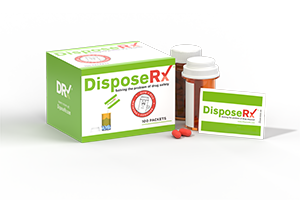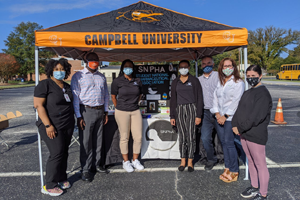 In conjunction with the Drug Enforcement Administration’s (DEA) National Prescription Take Back Day, October 24, 2020, DisposeRx launched a series of virtual webinars designed to draw attention to states severely impacted by the opioid epidemic and now pandemic. We hosted our first webinar on October 21, 2020, and focused on the state of Ohio. The townhall-type discussion was moderated by Courtney Hunter, vice president of state policy for Shatterproof, and the panel included: State Representative Tim Ginter from the 5th District; Nick Gonzales, Health and Wellness Compliance Officer/Chief HIPAA Privacy Officer for The Kroger Corporation; Ernie Boyd, Executive Director of the Ohio Pharmacists Association; Miranda Williams, Director of Pharmacy Programs, at the Ohio Bureau of Workers’ Compensation; and Stan Jackson, Care Manager Addiction Services at HealthSource of Ohio—a federally qualified health center.
In conjunction with the Drug Enforcement Administration’s (DEA) National Prescription Take Back Day, October 24, 2020, DisposeRx launched a series of virtual webinars designed to draw attention to states severely impacted by the opioid epidemic and now pandemic. We hosted our first webinar on October 21, 2020, and focused on the state of Ohio. The townhall-type discussion was moderated by Courtney Hunter, vice president of state policy for Shatterproof, and the panel included: State Representative Tim Ginter from the 5th District; Nick Gonzales, Health and Wellness Compliance Officer/Chief HIPAA Privacy Officer for The Kroger Corporation; Ernie Boyd, Executive Director of the Ohio Pharmacists Association; Miranda Williams, Director of Pharmacy Programs, at the Ohio Bureau of Workers’ Compensation; and Stan Jackson, Care Manager Addiction Services at HealthSource of Ohio—a federally qualified health center.
We encourage you to listen to the webinar in full; however, here are a few reflections from our distinguished panel.
Representative Ginter was sponsor of recent opioid legislation—HB341—that was signed into law by Governor Mike DeWine on September 16, 2020, and he shared some of the provisions of the bill which he believes will serve as a model for other states. He also spoke about the budget challenges that legislators and the governor are facing due to the opioid epidemic but assured the panel and those listening to the webinar that state leaders would not lose focus on the opioid public health crisis.
“I know as I speak on behalf of our other legislators that battling the drug epidemic in the state of Ohio is a very, very high priority.” Representative Ginter will continue to lead state efforts and in the near term is focused on ensuring for Ohioans appropriate treatment, access to treatment, properly funded treatment centers and criminal justice reform.
Nick Gonzales discussed the broad Opioid Stewardship program at Kroger Health, which includes being the first pharmacy chain to integrate Prescription Drug Monitoring Programs in 26 states into the pharmacists’ workflow, dispensing Naloxone with opioids where allowed, distributing DisposeRx packets to patients receiving certain prescriptions and participating in Drug Take Back events.
A key initiative is prescription drug use/misuse education and involves Kroger’s partnership with EverFi that started with a curriculum for high school students and recently expanded into modules for adults. Each module runs three to six minutes and is free to anyone who visits the website. Module topic areas include: proper storage and disposal of medication, how to support friends and families impacted by opioid addiction, how to talk with teenagers about opioids and opioid alternatives. “We have been in investing in how we can help curb the opioid epidemic. Our purpose is to feed the human spirit and at Kroger Health, our vision is to help people live healthier lives. Really, everything we do goes back to how we can achieve these goals,” Gonzales said.
Ernie Boyd shed light on some of the challenges pharmacies and pharmacists have experienced in recent years, including poor reimbursement by pharmacy benefit managers and Medicaid which forced the closure of more than 300 independent pharmacies. Boyd has worked for the past 18 months to encourage Medicaid managed care organizations to view pharmacists as providers and to reimburse them accordingly. “They (pharmacists) are finally being paid for slowing down and talking to the patient. Why? Because 55% of patients take their medications incorrectly…results in 10% of hospitalizations and 20% of all nursing home admissions,” Boyd said.
He also shared the expanded roles that pharmacists are playing in Ohio—a result of legislation passed over the past three years, as well as the pandemic. They are administering vaccines for adults and children, as well as conducting COVID-19 testing, and as soon as the coronavirus vaccine becomes available, they will be administering it as well. “The good news is we are being utilized a lot more.”
Miranda Williams highlighted the initiatives of the Bureau of Workers Compensation (BWC) to educate providers and injured workers about the opioid best practices they have implemented over the past decade to prevent opioid misuse and addiction. For injured workers, those best practices include a closed formulary, reimbursement for only six pills per day, preauthorization for some opioids and dispensing of Naloxone with opioid prescriptions. The Bureau is engaged in a research study of its opioid policies to determine the efficacy of the policies and to help inform other states about what works and does not work.
One of the newest BWC initiatives was announced by Governor DeWine last fall—reimbursing pharmacies for providing an at-home medication disposal method for each patient receiving an opioid for the first time. “We want injured workers to get rid of their leftover opioids as soon as possible,” Williams said. “We also feel that if we are reimbursing for the opioids, we should also cover the cost of making sure that they are disposed of safely.”
Stan Jackson discussed his critical role at HealthSource—a federally qualified health center that helps to provide integrated primary and behavioral health care to patients in eight counties in Ohio. As care manager of addiction services, Jackson describes his role as being the bridge to patients suspected of having a substance use disorder. Through motivational interviewing techniques, he “meets patients where they are” and encourages them to get into treatment. “I really try to build rapport with them. I let them know you do have HealthSource. And you have me for guidance, support and direction.”
Hunter, who was brilliant in her role as moderator, reminded the panel: “I cannot stress enough how important it is that we have corporations, non-profits, elected officials and health centers at the table here to invest in this space. It is the only was we can really fight this battle.”
DisposeRx will be hosting the second webinar in the series in November and will focus on the Commonwealth of Kentucky.




